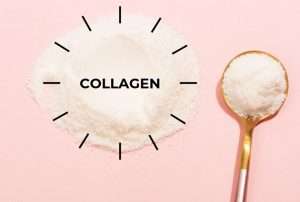What you need to know about Collagen – Benefits, Uses, and Application

Collagen is one of the most abundant proteins in the human body and has numerous benefits. It makes up for approximately 35% of the protein in a person and is one of the most important structural proteins that help in building and maintaining the bones, skin, tendons, blood vessels, and other hard as well as soft tissues.
One could describe collagen as what helps all these tissues stick together and perform their functions as a unit. Indeed, the word collagen has its origins from the ancient Greek word “kolla” meaning “glue” and the French word “gen” meaning “a specific kind”.
Collagen is what provides structure to the body and, in case of injuries, even allows the blood to clot, thereby preventing excessive bleeding. It helps the body form some of the main tissues like ligaments and bones.
Our skin is the largest organ of the body consists of 80% collagen. This is so because while most of the cosmetics or beauty products can only claim to work at the epidermis level, collagen functions at a layer deeper, known as the Dermis. It acts like the glue that holds everything together and operates as a cushion for the epidermis, consisting mostly of dead cells and keratin.

What happens is, as we grow older, the production of collagen in our body starts to slowly decrease. Collagen is what provides elasticity to most of our skin and as the dermis layer starts shrinking with age; the upper epidermis layer begins to form wrinkles.
Collagen is naturally produced by our bodies until our late 20s or 30s. After which we tend to lose 1% of collagen every year.
Thereby, going up on your collagen dosage is a good way to strengthen your skin and maintain its natural elasticity and hydration. It helps you keep your skin healthy, plump and supple.
Apart from tightening our skin, collagen also helps in building muscle mass, support heart health and prevent bone loss. Let’s look at some of these benefits in detail.
Health Benefits of Collagen Backed-Up by Science
1. Helps lessen joint aches
Joint pains can make it very uncomfortable to exercise, which can prevent you from reaching your goals. But collagen can help ease that pain for you.
Collagen helps to maintain the shape and form cartilage in your body, a rubber-like tissue that protects your joints.
There is also evidence that collagen can support connective tissues and improve joint pain post-exercise. For instance, as per a 2017 study, athletes with knee pain who took 5 g of collagen peptides daily for 12 weeks experienced less joint pain during exercise as compared to a placebo group.
Collagen supplements may help stimulate tissues to make more collagen by accumulating in knee cap cartilages. It can also help lower inflammation and reduce the risk of osteoarthritis.
For potential pain-relieving effects and get full benefits of collagen, a daily dosage of 8-12 is recommended.
2. Builds muscle mass
About 10% of our muscle tissues are composed of collagen. This helps to keep our muscles strong and functioning properly.
Research suggests that collagen supplements can boost muscle mass in people with sarcopenia, the form of muscle loss that happens due to aging.
In one study, 27 elderly men who took 15 grams of collagen while participating in exercise daily for 12 weeks gained significantly more muscle mass and strength compared to the ones who did not take collagen.
As per researchers, daily intake of collagen can help in the synthesis of muscle proteins like creatine, and also stimulate muscle growth post-workout.
3. Prevents bone loss
Most of our bones are made up of collagen. Collagen is what gives them support and structure, keeping them strong and standing.
With age, our bone mass also tends to decrease, which can lead to conditions like osteoporosis, in severe cases. It is a disease that is characterized by low bone density and carries a high risk of bone fractures.
Bone mineral density significantly decreases in women after menopause, according to the National Osteoporosis Foundation.
In a randomized, double-blind trial on 102 post-menopausal women, the ones who took collagen peptides for one year showed a marked increase in their bone mineral density compared to the group who took placebo doses.
Researchers theorized that this was because the collagen stimulated bone formation while slowing down bone loss, per an article in the journal Nutrients in January 2018.
Experts believe that the results are promising but further human trials are needed to prove the benefits of collagen for bone loss.
4. Supports a Healthy Heart
Researchers believe that taking collagen supplements may improve heart health.
Collagen is helpful in providing structure to your arteries, which are the blood vessels responsible to carry blood from your heart to the rest of your body. Lack of collagen can make the arteries go weak and fragile.
This may lead to a condition known as atherosclerosis, a disease in which the walls of arteries starts narrowing. Atherosclerosis can potentially lead to heart attack and stroke.
As per one study, when 31 healthy adults took 16 grams of collagen daily for 6 months, they experienced a significant reduction in measures of artery stiffness, compared with before they started taking the supplement.
Additionally, they increased their HDL or ‘good’ cholesterol level by an average of 6%. HDL is an important factor in the risk of heart conditions, including atherosclerosis.
Nevertheless, further study is required to say something conclusive.
Other Health Benefits of Collagen
Improves gut health: Collagen supplements are potentially easier to digest compared to other forms of protein. This is because the collagen found in supplements is usually in the hydrolyzed form (also known as collagen peptides), which is a more dissolvable form of amino acids that is easier for the body to break down.
Additionally, collagen can also help reduce inflammation in the gut thereby assisting in preventing leaky gut syndrome. Going by the theory, increased intake of collagen helps to create a favourable environment for the microbes in the gut; thereby promoting healthy function of the gut.
Skin fillers: Collagen injections are used to fill-out depressions and improve the contours of the skin. Fillers are used to cosmetically remove lines and wrinkles from the face and improve scare tissues. More extensive gaps are filled using fats, silicon or implants.
Wound dressing: Collagen is also used for generating new skin cells at the wound site. It promotes healing and provides support for the new tissues to grow.
Collagen dressings are useful in healing:
- Chronic wounds that don’t respond to other treatment
- Wounds that are rotting
- Severe second-degree burns
- Skin donation and skin grafts sites
Our body makes its own collagen
There are nutrients within the body that can help in collagen production. Collagen production starts off as procollagen. It is made by combining two amino acids – glycine and proline. Vitamin C is required for this process.
If you can make sure to get the following nutrients, you may very well help your body produce this important protein on its own.
- Vitamin C– Extensively found in citrus fruits, bell peppers, and strawberries
- Proline – Egg whites, wheat germ, dairy products, cabbage, asparagus, and mushrooms are considered good sources
- Glycine- Found in various protein-containing foods including pork skin, chicken skin, and gelatin, but glycine is also found in.
- Copper– found in large amounts in organ meats, sesame seeds, cocoa powder, cashews, and lentils.
Natural sources of collagen
Collagen is found mostly in the connective tissues of animal foods like chicken and pork skin.
Bone broth is known to be a particularly rich source of collagen, which is made by stewing the bones of chicken and other animals.
Gelatin can be considered as cooked collagen, and so it needs very high in the amino acids to produce it.
However, it is speculated that most of the collagen consumed from food sources might not be absorbed by the body. Therefore, supplements are a better means of assimilation.
Dosages and daily intake of Collagen
There are no official guidelines provided by health authorities for the amount of collagen to be consumed per day.
And so the amount of intake depends on why you’re taking it and the kind of results you’re expecting.
You can consume anywhere from 2.5 to 15 grams of collagen per day for it to be safe and effective.
Smaller daily doses of 2.5 grams could improve your joint pain, skin and hydration levels,
Increasing it to 5 grams can help improve bone density and up to 15 grams daily can help to improve your muscle mass.
You can also buy OLENA’s Wholefood Collagen Supplement from Amazon here.














